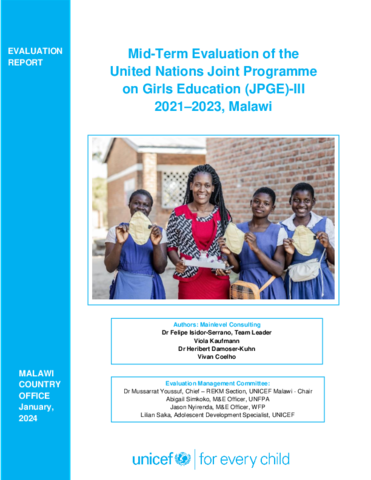
This decentralized mid-term evaluation (MTE) was commissioned by UNICEF Malawi jointly with UNFPA Malawi and WFP Malawi country office and covers the third phase of the Joint Programme for Girls Education (JPGE III) and evaluation period (2021 - 2023). The evaluation was led by UNICEF Malawi and it was carried out in 2023. Under JPGE III, three UN agencies—UNICEF, UNFPA, and WFP—collaborate with the Malawian Government to achieve outcomes related to education, health, and nutrition.
The core purpose of the MTE was to examine if the JPGE III objectives and outcomes were on track and recommend possible intervention changes for the remaining timeline for phase III of the project implementation and to guide future initiatives with similar goals. The evaluation was intended for both accountability and learning purposes. It focused on assessing the relevance, coherence, effectiveness, efficiency, impact and sustainability of the programme.
The evaluation covered the following agency-specific activities:
- UNICEF: Effective teaching and learning, second chance education for out-of-school girls, and nurturing a supportive community of parents, caregivers, and education stakeholders.
- UNFPA: Provision of sexual reproductive health and rights services.
- WFP: Provision of diverse and nutritious school meals, imparting knowledge on nutrition-related topics, and collaborating with smallholders to sell their products through WFP-supported aggregation systems.
Key findings included:
- Holistic approach: JPGE III employs a joint approach, addressing the root causes of educational disparities through nutrition, education, and SRHR, aligning with national policies and SDGs. It emphasizes stakeholder engagement to overcome infrastructure issues and sociocultural barriers.
- Strong collaboration: The program demonstrates robust collaboration among UN agencies, aligning with government policies and promoting coordination to prevent redundancy. It actively involves local stakeholders and partners to reinforce cooperation principles.
- Impact potential: JPGE III has significant potential to improve education access, aligning with SDG 4 and contributing to girls' education through SRHR services and infrastructure. Despite literacy and numeracy improvements, challenges persist in inclusive education and SRHR service provision.
- School feeding component: Associated with SDG 2, the school feeding component enhances literacy outcomes. The home-grown school program approach offers additional benefits, such as dietary diversity and cost-saving potential.
- Implementation challenges: Delays in funding processes and concerns about delayed funds for school meals, particularly in the first three months, hindered effective implementation, impacting outcomes negatively.
Key recommendations include:
- Strengthen monitoring and evaluation: Align KPIs with program objectives and consolidate data from all UN agencies for evidence-based decision-making.
- Proactive engagement with potential partners: Engage potential partners for continued support and ensure timely communication with schools regarding program continuity or phase-out.
- Improve WASH Infrastructure: Prioritize establishing or rehabilitating proper WASH facilities in schools.
- Enhance SRHR Services: Intensify efforts to tackle underlying causes, bolster low-threshold services like mobile clinics, and expand access to information and contraceptives.
- Promote School and Community Gardens: Encourage the promotion of gardens for integration into school lessons and replication at home.
- Identify a sustainable school feeding approach: Assist the Ministry of Education in completing the value for-money study to identify the optimal school feeding approach for Malawi and strategically allocating funds to sustain school feeding beyond JPGE schools to encompass the entire nation.
